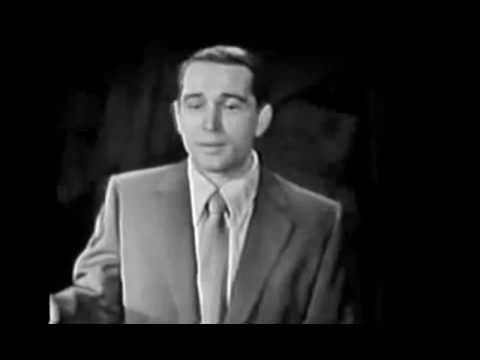Perry Como Show – Rudolph the Red Nose Reindeer – Dec. 10, 1955
Perry Como
Rudolph the Red Nose Reindeer
December 10, 1955
“Rudolph, the Red-Nosed Reindeer” is a song by songwriter Johnny Marks based on the 1939 story Rudolph the Red-Nosed Reindeer published by the Montgomery Ward Company. Gene Autry‘s recording hit No. 1 on the U.S. charts the week of Christmas 1949.
In 1939 Marks’s brother-in-law, Robert L. May, created the character Rudolph as an assignment for Montgomery Ward and Marks decided to adapt the story of Rudolph into a song.
The song had an added introduction, paraphrasing the poem “A Visit from Saint Nicholas” (public domain by the time the song was written), stating the names of the eight reindeer which went:
“You know Dasher and Dancer and Prancer and Vixen,
Comet and Cupid and Donner and Blitzen,
But do you recall
The most famous reindeer of all?”
The song was first sung by crooner Harry Brannon on New York City radio in early November 1949, before Gene Autry‘s recording hit No. 1 in the U.S. charts during Christmas 1949. The song was suggested as a “B” side for a record Autry was making. Autry rejected the song. His wife convinced him to use it. The success of this Christmas song by Autry gave support to Autry’s subsequent popular Easter song, “Here Comes Peter Cottontail.” Autry’s version of the song also holds the distinction of being the only chart-topping hit to fall completely off the chart after reaching No. 1. The official date of its No. 1 status was for the week ending January 7, 1950, making it the first No. 1 song of the 1950s.
The song was also performed on the December 6, 1949, Fibber McGee and Molly radio broadcast by Teeny (Marion Jordan’s little girl character) and The Kingsmen vocal group. The lyrics varied greatly from the Autry version. Autry’s recording sold 1.75 million copies its first Christmas season, eventually selling a total of 12.5 million. Cover versions included, sales exceed 150 million copies, second only to Bing Crosby’s “White Christmas”.
In December 2018, Autrey’s version entered the Billboard Hot 100 at #36, nearly 70 years after it first charted.
This site contains product affiliate links. We may receive a commission if you make a purchase after clicking on one of these links.


